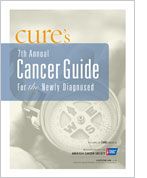Publication
Article
CURE
At Diagnosis: Learning About Cancer Online
When evaluating cancer information found on the Internet, consider the source
For many people facing cancer, the Internet is the first place to go for information. Whether they’re looking for help in making decisions about their illness or news about the latest treatment options, patients have greater access to cancer information than ever before. Many websites provide basic facts about certain types of cancer, current clinical trials and available support. Some also offer information on research articles, doctors and hospitals, cancer treatment guidelines, drug information and complementary and alternative therapies. Always remember, not all information is good information. And bad information can hurt when it comes to cancer.
User, Beware!
Cancer information on the Internet comes from many different sources—expert health organizations, government agencies, universities, merchants, interest groups, the general public and scam artists. Many of these sources are people or groups that really want to help others learn more. But because anyone can post information on the Internet, some people may be passing along information that is wrong. Some will even try to deceive people.
This is not to say that people shouldn’t trust anything on the Internet—just that they have to choose sources carefully. Even on trusted, highly regarded websites, it’s important to note that the health information is just general information that may not apply to a specific situation at all.
Always remember that the information found on the Internet should not take the place of medical advice. Anyone with a health-related problem should talk to a doctor. There is no other way to get the same level of experience and personalized care as sitting down with a doctor who can offer advice tailored to a patient’s health history and unique medical situation.
[How to Evaluate Cancer Information Found Online]
Searches produce commercial results along with those asked for, meaning search engines return "sponsored" findings with their search results. Often, these links are at the top of the result list. They may be in a box, in a different color, above a line, or below a header, but users should be able to tell these links from the results of the search. The sponsored results are actually ads for other websites. Sometimes users will find the links helpful, but many of the sponsors are trying to sell a product. Seller information can be helpful for many products, but it’s not likely to be the kind of information people want to use in choosing their cancer treatment.
Online Support Groups, Mailing Lists and Chat Rooms
Online support groups are made up of people who share information and support over the Internet through chat rooms, discussion boards or mailing lists. These websites allow people to connect with others like them who might otherwise be difficult to reach. They also allow people to keep their real identity private if they choose to do so.
Some people may find online support groups helpful. It may be comforting for some patients to share their experiences with other people who are facing the same things. Still, these places may not be the best sources of health information, especially if they are not monitored by trained professionals or experts. Patients should discuss any information they get with their healthcare team to see if it applies to their situation. Also, they should be aware that sometimes nonpatients monitor the conversations of online support groups.
Email Messages
If visitors share their contact information, emails may start pouring in. Well-meaning friends and family may also send emails with cancer information and various cancer treatment options. Patients should carefully evaluate any email messages they receive. Consider the source of the message and its purpose. Many companies and organizations use email to advertise or attract people to their websites. The accuracy of the information may be influenced by their desire to promote their product or service.
One way to sift through the information is to identify respected, reliable sources of health information and use them as primary resources.
[Reality Checkers: Reliable Online Sources]
Adapted with permission of the American Cancer Society






